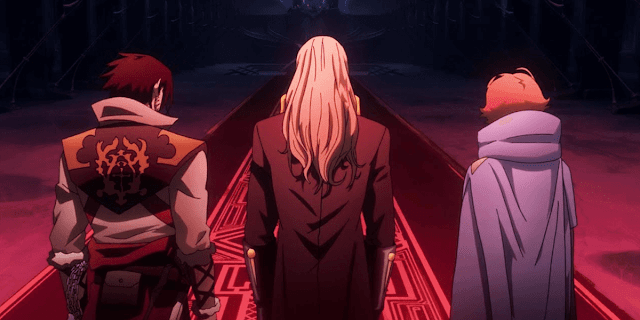Castlevania: Season Two (Review)

Castlevania
2018 Netflix
Season Two
The Nicsperiment Score: 10/10
I'll never forgot the time my mom took me to see Super Mario Bros. I'd just finished elementary school and was geared up for middle school. The summer of 1993 was looking bright. A movie about my favorite video game series? Could it get any better? Then we get to the theater. There are two other people there, a teenage couple on the front row who make out for the entirety of the "film." Meanwhile, as Super Mario Bros. mercilessly shrugs along, I can see my mom, who had been begged by me for weeks to go to the movie, shifting in her seat. The movie is absolutely, incomprehensibly awful.
The Super Mario Bros. movie began a trend that over the last 25 years, has seemed to have no chance of being broken: video game adaptations are terrible. They can never be done right to please the fans, or the critics. It doesn't matter who makes them, or who stars in them: they always stink, and everyone hates them. It's understandable that video games don't easily adapt to films. They're an interactive form of media, and the actions therein, i.e. killing enemy after enemy, are repetitive and don't exactly lend themselves to exciting viewing. However, they do usually have some semblance of story...is it really impossible to convert them into an acceptable form of another type of media?
After 25 long years of excruciating "yes"'s to that question, executive producer, Adi Shankar, directors, Sam Deats and Ryoichi Uchikoshi, and writer, Warren Ellis, have finally answered "no."
It all starts with not only a respect and understanding for the material, but a respect and understanding of the media form it's being adapted for. The Castlevania games generally feature a simple story about fairly simple characters fighting against the evil vampire, Count Dracula, in medieval Eastern Europe. The eight episode, second season of the Castlevania animated series for Netflix adapts the NES classic, Castlevania III: Dracula's Curse. The 1990 standout game features Trevor Belmont, from a long line of vampire hunters, Sypha Belnades, a magician, and Alucard, the son of Dracula (another character from the game, Danasty, is left out of the series), who fight together to defeat Dracula.
In the series, the wizened, bitter Dracula has his heart softened by an empathetic human woman, marries her, and has Alucard. The religious authorities think that Dracula's wife, who is a doctor, is a witch, and burn her at the stake. Dracula then goes on a murderous rampage, assembling the armies of the dead, and all matter of evil creatures, to destroy the human race. The Trevor Belmont of the series is the last of the Belmonts, raising himself since the age of 13, when the same religious authorities wiped his family out, and burned his house down...thematically linking him to Dracula. Sypha is a powerful magician who has never left her people. Alucard, meanwhile, is sympathetic to his mother's species, and can't stand by while his father wipes them out. Shankar and crew find immense depth in not only this trio, and how they meet, relate to, and bond with one another, but with the relationships between Dracula and his closest associates, as well.
Yep, the filmmakers have successfully created an engaging cinematic narrative. It's a damn miracle. That's great and all, but what about all the cool details in the Castlevania games, the cool weapons, the heroes' incredible, detailed abilities? Shankar and crew haven't dropped the ball there, either.
When Alucard dashes around during fights, he's trailed by a red outline, just like in the games. When the heroic trio dive into the ruins of the old Belmont home, Trevor unearths the fabled, extremely powerful Morning Star whip, just like in the game. Sypha shoots flames, and conversely, deathly ice crystals from her hands, just like in the game. If the characters did all this game stuff in the series, but the story and character work weren't there, this would be yet another failed adaptation. If the story and character work were all there, but the video game details were missing, the series wouldn't feel like Castlevania. No previous video game adaptation has even gotten one side of the two right. Castlevania nails both.
Warren Ellis creates such clear distinct characters here, the voice actors absolutely nail his dialogue, the animators and directors have created a feast for the eyes, and composer, Trevor Morris, even works in a classic Castlevania musical piece at a climactic, absolutely awe-inspiring moment. Honestly, in that moment, my eyes started watering, not only because my nostalgia muscles were being tweaked, but because those muscles weren't just being stirred by sentiment, but by actual high-quality filmmaking. Castlevania is now not only the standard by which all video game adaptations should be measured, but a landmark in animated series and action series, as well.
Best of all: I've wanted to hand out a ten since I started reviewing television show seasons. They all mess up somewhere. Castlevania's second season doesn't. Every moment is important, every payoff is earned, every detail is perfect. Here's my first "10." This is one of the greatest things I've ever seen.


Comments